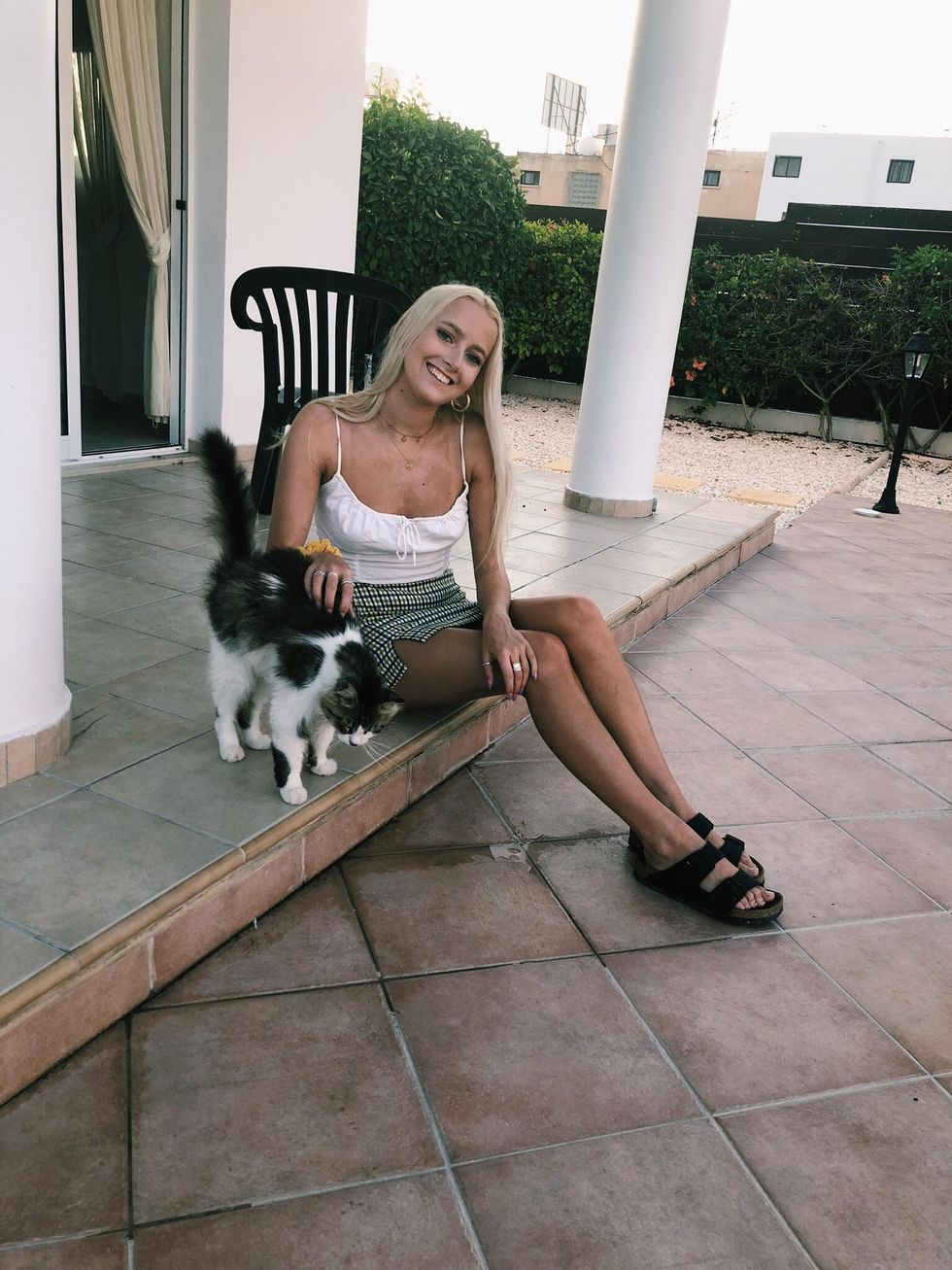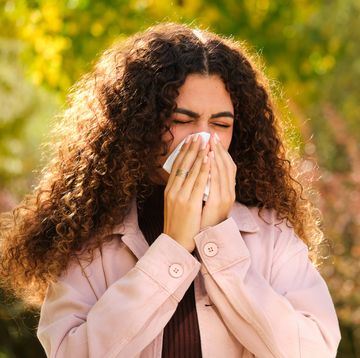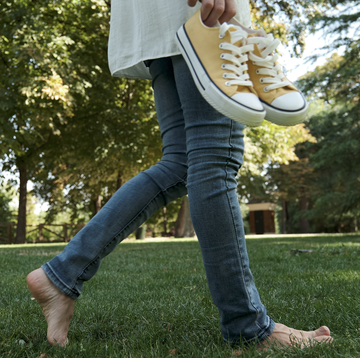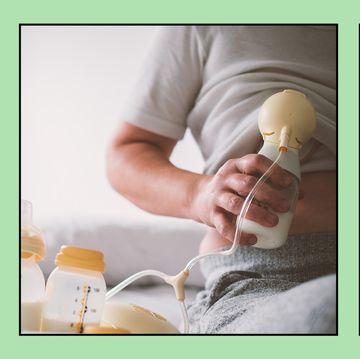“I was at Creamfields festival when I was rushed to hospital with sepsis. It came from a water infection [a UTI]. I ignored it for a long time, because I didn’t know what sepsis was, and I didn’t know the risks of ignoring it,” says Poppy.
The 22-year-old’s story might sound extreme, but she’s one of 245,000 people diagnosed with sepsis in the UK every year. Dr Ron Daniels, CEO at Sepsis Trust UK tells Cosmopolitan: "Sepsis is the way the body responds to an infection. It’s always triggered by an infection, but in sepsis the immune system goes into overdrive. If we don’t stop it, that begins to spread to the organs.
"Sepsis can arise as a consequence of any infection, but most commonly infections in the lung, urinary tract, or something as simple as a cut, bite or sting."
Poppy was convinced she would be able to shake her symptoms. “I was having debilitating pain in my stomach, I couldn’t move, I couldn’t talk, I was crying," she said. "I went to the festival anyway, and on the first night we decided to go to the silent disco. I was in so much pain, and I felt so awful that I wrote a note on my phone to my friends, basically saying ‘I need to go back and lie down’. We had taken an air mattress, and the whole night my body was shaking so much that the mattress was shaking. I was so cold, it was a feeling I’d never felt before, and I wasn’t passing urine properly, but I thought that was just because I had an infection.
“The next day I woke up and told my friends I needed to go to the welfare tent. When I got there I had about seven nurses standing around me, and they were all like ‘What is going on with you?’ They didn’t understand, I was telling them I had a water infection, and then suddenly they were pumping me with morphine and antibiotics.
“I was put in an ambulance and taken to hospital where they put me on a surgery ward because I had suspected appendicitis. A doctor came in and saw me, and he elbowed me in my kidney, and I screamed in pain, and he was like: ‘Right, it’s not appendicitis’. I’m not sure when it was that they suspected it was sepsis, but it was from that moment that I was having morphine. I was on antibiotics that they described as ‘the drain cleaner of antibiotics’, and they were so strong that it hurt.
“The whole time I was in hospital, I still kind-of refused to accept how poorly I was. I was in this positive ‘I’m fine!’ mindset, and actually the nurses were saying ‘I don’t know what’s going on with her because she’s the sickest patient on our ward, her white blood cell count is through the roof and we haven’t seen anything like this for a long time. She can’t leave’. Every day I would wake up and ask if it was time to go home yet."
“I wasn’t actually told the whole time I was in hospital that it was sepsis. My mum read my discharge notes, she read sepsis and she sobbed. I was like, ‘What are you doing? I’m fine, look. We’re leaving.’ I still didn’t know what it was, but I made the mistake of coming home and searching, and the things I read could still make me cry now.”
It’s no wonder Poppy’s search left her terrified; Google results will tell you that 11million people every year die from sepsis, and 48,000 of those in the UK - more people than die from breast, bowel and prostate cancer combined. The condition, (also known as blood poisoning) is the immune system’s overreaction to an infection or injury, and 40% of sufferers will have life-altering damage afterwards. For Poppy, the mental effects were worse than anything else.
"I found the aftermath of having sepsis the hardest," she told Cosmopolitan. "I came out of hospital, and none of my friends knew what sepsis was, I didn’t know what sepsis was. People who did understand would come up to me and say: ‘Wow, you’re so lucky! I can’t believe this has happened, I can’t believe you survived.’ People would call me a survivor, call me lucky - and then I started to feel an immense amount of guilt, but I didn’t know what it was, or how it happened that I survived.
"I had post-sepsis syndrome, which is about your mental health and your immune system and everything that comes from having sepsis. For about 18 months after I was so prone to getting infections that every month I was at the doctor’s, being prescribed antibiotics constantly, because my body just couldn’t fight anything.
"I found the Sepsis Trust and started donating money monthly, but then I got a call from a man who asked if I was interested in doing some volunteering, which I thought would be great. They asked me to do a fundraiser in Nottingham for a little girl who was five, and had died from sepsis. I turned up, stood on stage in front of all of her family, all of her friends, and her mum introduced me as a 'sepsis survivor'. They gave me a round of applause, they were sobbing, and I think that was kind of a turning point for me.
"After that I ignored it for a long time. I had a year of being like, ‘This happened, but I won’t address it.’ I was still getting ill all the time, and it was very stressful and really sad. It was throughout my second year of uni, and I was going to the doctor monthly. In third year I went onto antidepressants. I thought I would come out fine because I didn’t have physical after-effects. I thought ‘I’m lucky, I’m fine’. But it was just the more I ignored it, the more guilty I felt. It was this really weird cycle… I felt bad that I didn’t die. Because so many people did.
"I just had this overwhelming guilt. Then I went to therapy, and that helped. I think it maybe hit me so hard because when I was in hospital I didn’t even know what it was, and then I was met with this, ‘Woah, you’re so lucky, you didn’t die’.
"Therapy helped. Whenever I have to talk about something serious, I kind of turn it into a joke, so I’d never actually spoken about it in a serious way. So I sat with my therapist, and I just had to talk about it.
"And now? I’m fine. I genuinely mean it when I say that - after so many years of saying it and not really meaning it. My immune system is better, and sometimes I still feel a bit sad about it. I’m still in contact with the young girl’s parents, and talking to them has become easier."
What is sepsis, and how do you get it?
Ron Daniels explains: "Sepsis can affect anyone at any age. It’s far more likely to occur in the elderly and the very young, particularly children under one. It’s relatively less common in healthy young adults, but as Poppy’s story reminds us, sepsis can affect even the fit and healthy.
"As a person begins to develop sepsis, the early signs are often indistinguishable from flu. There are some hallmark symptoms to look for - but the first step is to trust your instinct. If you’ve never felt this unwell before, and particularly if you’re deteriorating, phone 111 or go and see your GP, and ask if it could be sepsis. If you’re really worried, look for one of these six symptoms, which spell the word ‘SEPSIS’:
- Slurred speech or confusion
- Extreme pain in the muscles or joints
- Passing no urine in a day
- Severe breathlessness
- It feels like I’m going to die
- Skin that’s mottled, discoloured or very pale
"If you have any one of those six symptoms in the context of infection, go straight to A&E.
"Most cases of sepsis arise in the community as a consequence of infection with common bugs we all carry in and on our bodies. We can’t prevent every case of sepsis but awareness of the symptoms, and knowing what to do, will help to prevent it causing lasting harm. There are, of course, basic strategies that we should all undertake to prevent infections. These include; basic hygiene and sanitation, washing our hands after using the loo, when preparing food, or if in contact with a person at risk, an ensuring that we’re up-to-date with any vaccinations offered to us. "
For help and support with sepsis, or for more information, visit sepsistrust.org.
Like this article? Sign up to our newsletter to get more articles like this delivered straight to your inbox.
















